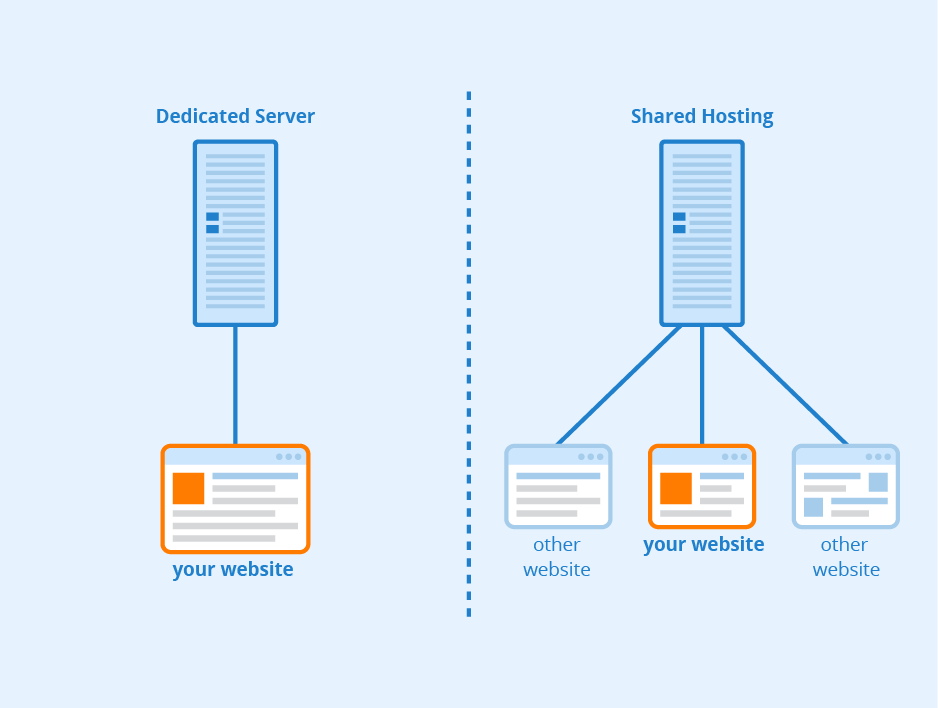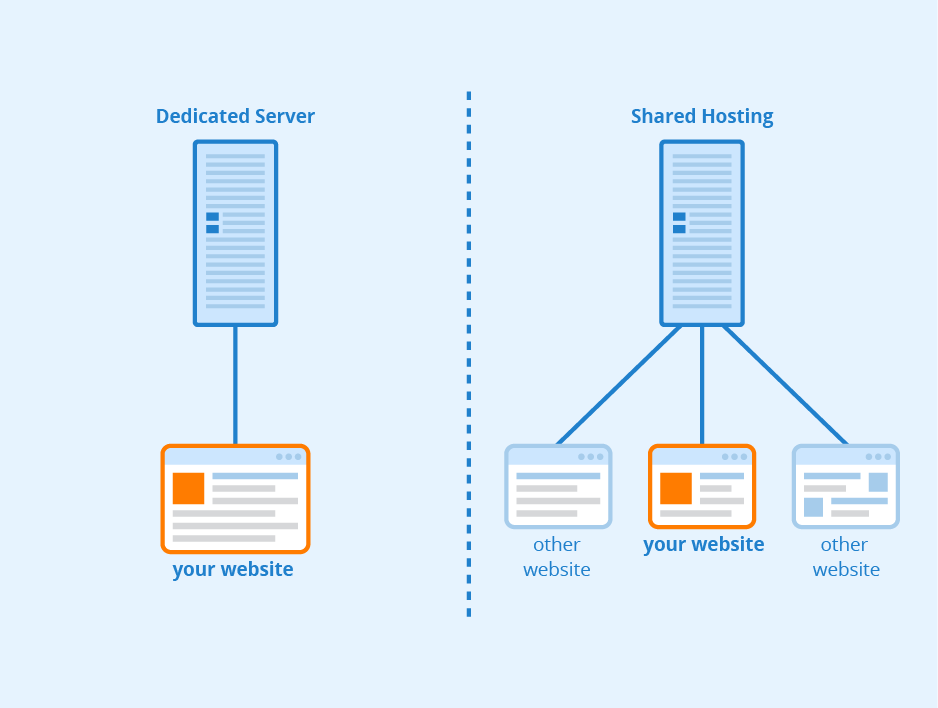In web development, hosting refers to the process of storing and making websites accessible on the internet. It is an essential aspect of creating a successful online presence. Without hosting, websites cannot be accessed by users worldwide. Hosting allows businesses and individuals to store their website files on a server, ensuring that their website is available 24/7. It provides the necessary infrastructure and resources to keep websites running smoothly.
Hosting plays a crucial role in web development as it determines the speed, reliability, and security of a website. Choosing the right hosting provider is essential for optimal performance. With a wide range of hosting options available, including shared hosting, virtual private servers (VPS), and dedicated servers, businesses can select the hosting solution that best fits their needs and budget. Additionally, hosting providers offer various features such as website builders, email accounts, and domain registration, further enhancing the website development process. Reliable hosting ensures that websites can handle high traffic volumes, leading to improved user experience and better search engine rankings.
Hosting in web development refers to the process of storing and making websites accessible on the internet. It involves renting server space where the website files are stored, enabling users to access the website from anywhere in the world. Hosting providers offer various plans with different features like storage, bandwidth, and security. Depending on the needs of your website, you can choose shared hosting, VPS hosting, or dedicated hosting. With hosting, your website becomes accessible and visible to the online world.

Understanding Hosting in Web Development
When it comes to web development, hosting plays a crucial role in bringing a website to life on the internet. Hosting refers to the process of storing and making a website accessible to users on the World Wide Web. In simple terms, a web hosting service allows individuals and organizations to make their website available for viewing by others on the internet. This is achieved by storing the website files and data on a server provided by a hosting provider.
Web hosting comes in various forms, from shared hosting to dedicated hosting, each offering different levels of control, performance, and security. In the world of web development, understanding the intricacies of hosting is essential to ensure a seamless user experience and optimize the website’s performance. Let’s delve deeper into the world of web hosting and its significance in web development.
To explore more about web hosting, it’s important to understand how websites work. Every website consists of a collection of files, including HTML, CSS, JavaScript, images, videos, and more. These files are stored on a server, a powerful computer designed to host websites, and connected to the internet. When a user wants to access a website, their web browser sends a request to the server, which then delivers the website files to the user’s browser, allowing them to view the website.
To ensure smooth and efficient hosting, web hosting providers offer a variety of services and features. These include server maintenance, technical support, security measures, domain registration, and more. The choice of web hosting service depends on the website’s requirements and the level of control and resources needed.
Types of Web Hosting
There are several types of web hosting, each designed to cater to different needs and budgets. Here are some of the most common types of web hosting:
1. Shared Hosting
Shared hosting is the most common and affordable type of web hosting. In shared hosting, multiple websites are hosted on a single server, sharing its resources such as processing power, memory, and storage space. While shared hosting is cost-effective, it may lead to slower website performance if one website on the server experiences high traffic or resource usage.
Shared hosting is suitable for small to medium-sized websites that do not require a high level of resources or customization. It is a good option for beginners or those with limited budgets.
Some popular shared hosting providers include Bluehost, SiteGround, and HostGator.
2. VPS Hosting
VPS (Virtual Private Server) hosting combines the affordability of shared hosting with the control and performance of dedicated hosting. In VPS hosting, a physical server is divided into multiple virtual servers, each having its own resources and operating system.
This allows websites to have their dedicated resources and greater control over server configurations. VPS hosting is suitable for websites with moderate to high traffic or those requiring custom software installations.
Some popular VPS hosting providers include DigitalOcean, Linode, and Vultr.
3. Dedicated Hosting
Dedicated hosting provides the highest level of control, performance, and security. With dedicated hosting, you have an entire physical server dedicated solely to your website. This means you have full control over server configurations, resources, and security measures. Dedicated hosting is suitable for high-traffic websites, e-commerce platforms, and applications that require maximum performance and data security.
Due to its high level of resources and customization options, dedicated hosting is generally more expensive than shared hosting or VPS hosting.
Some popular dedicated hosting providers include Liquid Web, OVH, and InMotion Hosting.
4. Cloud Hosting
Cloud hosting is a scalable and flexible hosting option that utilizes resources from multiple servers connected in a network. This allows websites to handle high traffic and provide uninterrupted service even if one server fails. Cloud hosting is suitable for websites experiencing unpredictable traffic surges or those requiring high availability and scalability.
Some popular cloud hosting providers include Amazon Web Services (AWS), Google Cloud Platform, and Microsoft Azure.
Each type of web hosting has its advantages and disadvantages, and the choice depends on the specific needs and goals of a website.
Factors to Consider When Choosing a Web Hosting Service
Choosing the right web hosting service is crucial to ensure the optimal performance and stability of your website. Here are some key factors to consider when selecting a web hosting service:
1. Reliability and Uptime
Reliability and uptime are crucial for any website. Look for a hosting provider that guarantees a high uptime percentage (ideally 99.9% or higher) to ensure your website is accessible to users at all times.
2. Customer Support
Choose a web hosting provider that offers reliable customer support. Look for 24/7 support through various channels such as live chat, phone, and email. This ensures you can quickly resolve any technical issues or queries that may arise.
3. Performance and Speed
Website performance and speed are critical for user experience and search engine rankings. Opt for a hosting provider that offers fast server hardware, caching mechanisms, content delivery networks (CDNs), and other performance-enhancing features.
4. Scalability and Upgrades
Consider the scalability options provided by the hosting provider. As your website grows, you may need more resources or the ability to upgrade your hosting plan easily. Ensure the hosting provider offers scalable options to accommodate your website’s future needs.
5. Security Measures
Website security is of utmost importance. Choose a hosting provider that implements robust security measures, such as firewalls, regular backups, malware scanning, and SSL certificates, to protect your website and data from threats.
6. Pricing and Plans
Consider your budget and compare the pricing and features of different hosting providers. Be cautious of providers offering extremely low prices, as it may indicate poor performance, limited resources, or unreliable service.
It’s worth investing in a reputable hosting provider that offers a balance between quality service and affordability.
The Importance of Hosting in Web Development
Now that we have explored the different types of web hosting and the factors to consider when choosing a hosting service, let’s delve into the importance of hosting in web development.
1. Performance: The hosting service you choose can significantly impact your website’s performance. A reliable and fast hosting provider ensures quick loading times, seamless user experience, and decreased bounce rates.
2. Security: A reputable hosting provider implements robust security measures to protect your website against cyber threats, such as malware attacks and data breaches. Regular backups and SSL certificates offer an additional layer of security.
3. Scalability: As your website grows, you may need to scale up your resources or upgrade your hosting plan to accommodate increased traffic and data. A scalable hosting service allows for seamless expansion without downtime.
4. Search Engine Optimization (SEO): Website speed and uptime are crucial ranking factors in search engine algorithms. By choosing a reliable hosting service, you can improve your website’s SEO performance and increase its visibility in search engine results.
5. Customer Experience: Hosting affects the overall user experience of your website visitors. A slow-loading website or frequent downtimes can drive away potential customers and negatively impact your brand reputation. Opting for a reliable hosting service ensures excellent customer experience and satisfaction.
In conclusion, hosting is an integral part of web development that determines the performance, security, scalability, and user experience of a website. By understanding the different types of hosting, considering key factors when choosing a hosting service, and recognizing the importance of hosting, web developers can ensure their websites are optimized for success.
For expert advice and industry insights on web development, visit [website name] and stay up-to-date with the latest trends and technologies.
Key Takeaways
- Website hosting is the process of storing and making a website accessible to users on the internet.
- Web hosting providers offer different types of hosting plans, such as shared hosting, VPS hosting, and dedicated hosting.
- Choosing the right hosting provider is important for website performance, security, and scalability.
- Hosting services often include features like domain registration, email accounts, and website builders.
- Before selecting a hosting provider, consider factors like uptime guarantee, customer support, and pricing.
In web development, hosting refers to the process of storing and making your website accessible on the internet. When you create a website, all the files and data related to your site need to be stored on a server, which is provided by a hosting company.
Hosting allows users to access your website by typing in your domain name into their web browser. It ensures that your website is available, reliable, and accessible 24/7, allowing visitors to view and interact with your site at any time.

